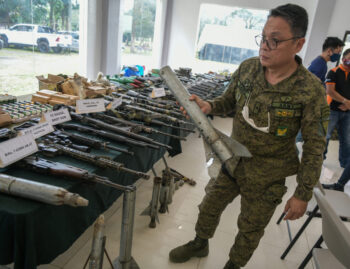GENERAL SANTOS CITY (MindaNews/1 Sept) – Some 400 foreign and domestic players in the tuna industry will gather here Friday for its 12th national congress, which will highlight discussions on the current crisis facing the industry brought about by the two-year fishing ban in international waters off the central and western Pacific Ocean.
Marfenio Tan, president of the Socksaksargen Federation of Fishing and Allied Industries Inc. (SFFAII), said Wednesday they will mainly tackle possible solutions to the present slump as triggered by the fishing ban and other strategies that would help sustain the country’s multibillion tuna industry.
“Right now, we’re really facing a difficult situation because of the fishing ban. About 30 percent of the industry’s operations were already affected so far and might even get worse if this concern will not be resolved the soonest time,” he said in a press conference.
The 12th National Tuna Congress is slated September 2-3 at the Family Country Hotel and Convention Center here.
The theme for this year’s congress is: “Be Counted… Face the Challenges and Make a Difference.”
The congress proper is scheduled Friday while the two-day trade fair and exhibit, which will feature developments on the latest fishery and tuna production technologies, gadgets and equipment, will be unveiled at the same venue Thursday.
The SFFAII secretariat staff told MindaNews that they have invited President Benigno Simeon Aguino III as keynote speaker but they have not yet received a confirmation as of Wednesday morning.
Among those who confirmed to attend Friday’s congress were Ambassador Alistair MacDonald, head of the delegation of the European Commission (EC) to the Philippines, and Cebu (4th District) Rep. Benhur Salimbangon, chair of the House Committee on Aquaculture and Fisheries Resources.
The confirmed foreign delegates are from France, Iceland, Thailand, Singapore, South Korea and Japan.
During the congress, Tan said they will present to the Aquino administration at least eight resolutions covering various pressing concerns affecting the industry.
He said these include the proposed creation of a separate Department of Fisheries and Aquatic Resources, immediate approval and issuance of the implementing rules and regulations (IRR) of Republic Act 9379 or the Handline Fishing Law, establishment of exclusive fishing grounds for handline fishing, funding support for fisheries studies and research, relationship-building with other tuna-producing countries, re-orientation of security forces in Mindanao as well as issues on the country’s baselines and the registration and licensing regulations of the Maritime Industry Authority and the Bureau of Fisheries and Aquatic Resources.
“We’re expecting the national government to immediately respond or attend to these concerns,” Tan said.
This city, which is dubbed the Philippines’ tuna capital, posts an average tuna landings of 400,000 metric tons a year and generates at least US$280 million in export revenues.
But the tuna industry here went on a major slump this year due to the implementation of a two-year fishing ban starting last January 1 in the international waters off the western and central Pacific Ocean by the Western and Central Pacific Fisheries Commission (WCPFC).
The WCPFC was established by the Convention for the Conservation and Management of Highly Migratory Fish Stocks in the Western and Central Pacific Ocean, of which the Philippines was a signatory, that came into force in 2004.
The commission imposed the fishing ban on all of its 25-member countries and 10 other observer-states as a result of scientific studies and the emergence of statistics that showed the drastic decline of tuna fish stocks, especially bigeye and yellowfin tuna.
Local tuna fishing companies estimated a drop of 10 to 30 percent in tuna catches this year as a result of fishing ban.
The Department of Labor and Employment in Region 12 noted that at least 16 tuna fishing and processing companies have already been affected by the ban.
It said some 805 workers were displaced during the first half of the year and an additional 691 as of last July or a total of 1,496 workers as a result of the fishing ban. (Allen V. Estabillo/MindaNews)







